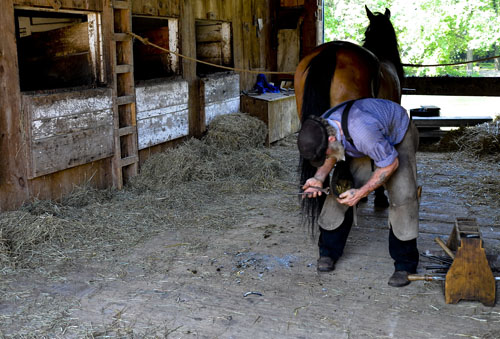5. Naming Convention – In many cultures, children are named after their ancestors. This information can be invaluable in trying to track down previous generations. Sometimes, naming conventions in families can provide even more information. For example, Eastern European Jews typically named children after deceased relatives, not living relatives. Not only does this provide a name into the previous generation but it also provides a date range for the death of one individual and the birth of another.
6. Anglicized Family Names – We have talked before about how people would often anglicize their family name when they move to an English-speaking country. Anglicization is the process of making a name sound more English.
Another possibility is the family (or more likely a ship's officer if your ancestors immigrated by ship) may have translated the name into English. This can occur if the family name happens to be a thing, a color or an occupation.
For example, the French family name Boisvert is popular in Quebec. It directly translates into the name Greenwood in English. So, if your last name is Greenwood and you suspect that your family came from France (or Quebec) then try tracing your ancestors through the name Boisvert.

Always consider the possibility your family name was translated into English when trying to trace your family back to the ‘old country’. A neat trick you can use to reverse engineer this possibility is to take your family name and run it through an online translator from English into the language of your ancestors. Just remember, this likelihood is most likely to occur if the family name happens to be something that translates easily into other languages.
7. Anglicized Family Names Again - France was one of the three main countries that helped colonize North America (the other two being Britain and Spain). As a result, many people in North America have French ancestry, even if they are not aware of it. This is most likely if you have ancestors originating from Eastern Canada, Northeastern United States and around Louisiana.
Over time, many people with a French background Anglicized their family names. Sometimes these Anglicizations are fairly easy to figure out, such as the French surname Allain being converted to the English equivalent of Allen. Often, however, the forms of an Anglicized name can be difficult to predict, even for someone well versed in the French language. For example, the French surname LaLiberte becoming the English surname Bow.
Fortunately, the Quebec Genweb Project maintains an excellent and detailed list of English surnames and their North American French equivalent. This is a wonderful resource to consult if you have French ancestry in your family. Even if you don't think you have any French ancestry, it may well be worth taking a look. Who knows, it could open up a whole new avenue of exploration that you hadn't considered. [List of Anglicized French Surnames]

8. Junior and Senior – The titles junior and senior can provide so much misinformation that we sometimes wonder if it is better to just ignore the titles. Here are some reasons why junior and senior can lead you down the wrong path.
First, don’t assume that junior and senior are father and son. The titles junior and senior just means there are two people in the same family with the same first name. It could be a man and his grandfather or a man and his uncle, for example.
In small communities, junior and senior were even sometimes used to distinguish unrelated people who happened to have the same first name.
The second major problem with junior and senior is that the title can shift over time for the same person. For example, junior becomes the senior when the senior dies.
The only real information the titles junior and senior provide is that you know someone else in the family or neighbourhood had the same first name and that is all you know.

